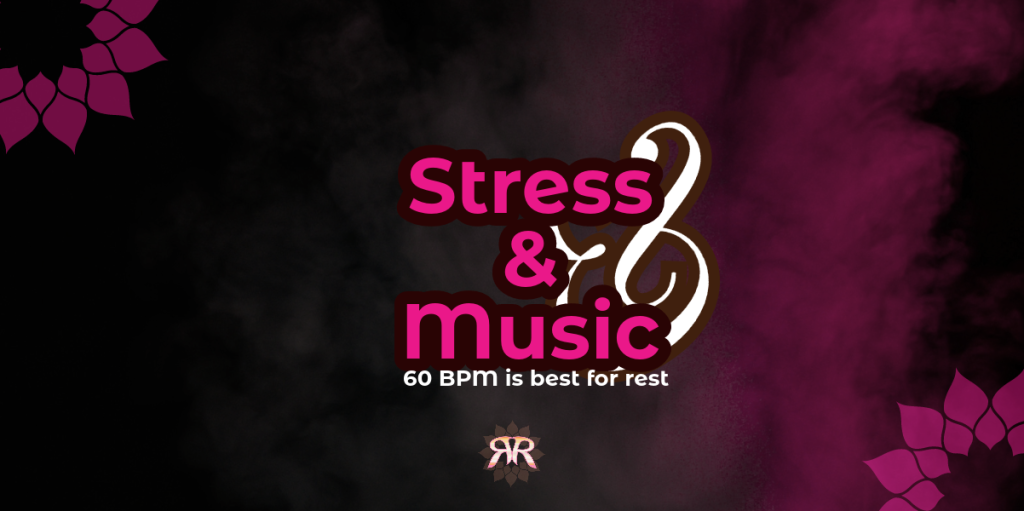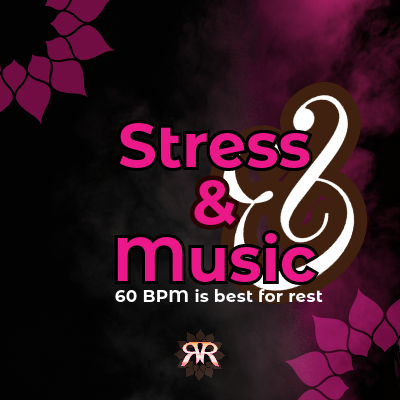Table of Contents

Stress and Music: Introduction
Many people, maybe even you, suffer from an excess of nervous tension. You may be wondering what to do. Listening to your favourite song is enjoyable, but music you enjoy can also help manage those intrusive, anxious thoughts. If you have ever asked yourself “how does music help with stress“?, then read on. I will do my best to explain.
Types of Stress
Let’s start by understanding what stress is. We usually think of stress as something negative. “Distress“. However, stress can also be positive. “Eustress“. The right amount of pressure can motivate us to complete tasks and achieve goals. This lovely video by Anne-Laure Le Cunff will help you to understand the difference between distress and eustress. The takeaway: not all stress is bad. But, an excess of stress can have negative consequences.
In this post, I will focus on distress, or negative stress. My next post will look at the relationship between music and positive stress. So that you won’t miss a thing, why not bookmark my blog page?
How does music help with stress?
Music has long been known to have a positive impact on our emotions and overall well-being. It has the power to uplift our spirits, evoke memories, and even help us relax. Music can be a powerful tool to help us cope with the pressures of everyday life.
I am studying Neuromusic, so it is important for me to understand the scientific basis for music’s ability to help manage stress.
60 BPM is said to be the best for rest.
Heart rate and blood pressure
According to websites, a research paper from Stanford University suggests that a frequency of 60 BPM is ideal for relaxation and stress relief. I have not been able to find the source of that oft-repeated claim. I found a research paper from India that tried to answer the question “how does music help with stress” by comparing the effects of low and high BPM music on heart rate and blood pressure. The relationship between stress and music could be influenced by the connection between heart rate and blood pressure in the carotid artery.
There was a decrease in the mean of both the systolic and diastolic blood pressures of the subjects on listening to slow music, which was found to be statistically significant. This may be due to modulation of the cardiac autonomic nervous system by stimulation in the form of auditory input
https://www.ijpp.com/IJPP%20archives/2017_61_4/445-448.pdf
Other ways that music may help with stress
Release of Dopamine
Music reduces stress by triggering the release of chemicals in our brain that promote relaxation, like Dopamine.
Reduction in perception of pain
Physiological stress is associated with the release of various neurotransmitters. People with chronic stress suffer from negative emotions like worry, rancor, ire, or fear. Frequently, stressed out folks feel little or no joy and derive little pleasure from life.
A recent study found that listening to music can help to reduce how strongly we feel pain.
Promotes Calmness
Slow-tempo instrumental music, such as classical, ambient, or nature sounds, effectively promotes calmness and reduces anxiety.
Healthy distraction
Music also serves as a distraction from our stressors. Focusing on the melody, rhythm, and lyrics helps us forget about stress and find comfort in the music. Moreover, music can activate the body’s relaxation response, which helps counteract the physiological effects of stress. Also, attending live music events is inherently social, and we know that nurturing healthy social relationships is vital to our health.
Lower Blood Pressure and Heart Rate
It can lower our heart rate and blood pressure, as well as reduce muscle tension and promote deeper breathing.
Channel Emotions
Playing an instrument, singing, or dancing can also help reduce stress. Engaging in these activities can help channel our emotions and provide a creative outlet for self-expression.
Learning to play a musical instrument provides a peaceful retreat from the pressures of daily life. Therapeutic outcomes of playing music include better communication skills, improved emotional release, and decreased anxiety and agitation.1 Musical training promotes cognitive function, mental health, and a connection to others.
https://www.ncbi.nlm.nih.gov/pmc/articles/PMC6368928/
Summing Up
Overall, incorporating music into our daily routine can play a significant role in managing stress. Music has the power to calm our minds and provide relief from life’s pressures. You can enjoy it in many ways, like making playlists, going to live concerts, or just taking a moment to listen to calming music.
The Most Relaxing Song?
Weightless by Marconi Union is meant to be the world’s most relaxing song. Have a listen and decide for yourself.
Brain Massage with 8-D music
Get your headphones ready and listen to this clip. For me, it’s one of the most luxurious feelings ever, to have that sound moving around my head and stimulating my brain. Let me know if it does anything for you.

